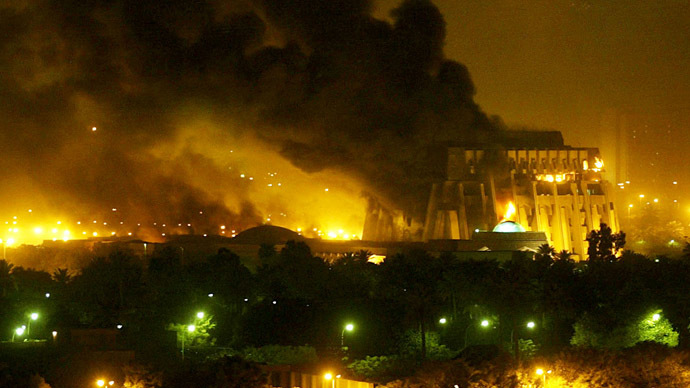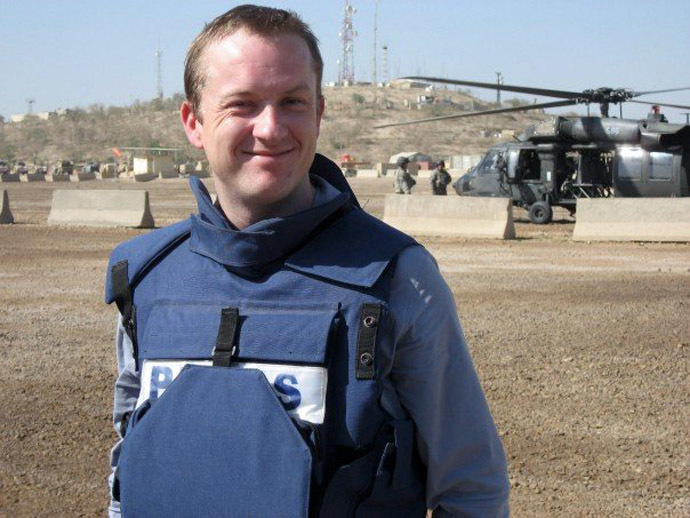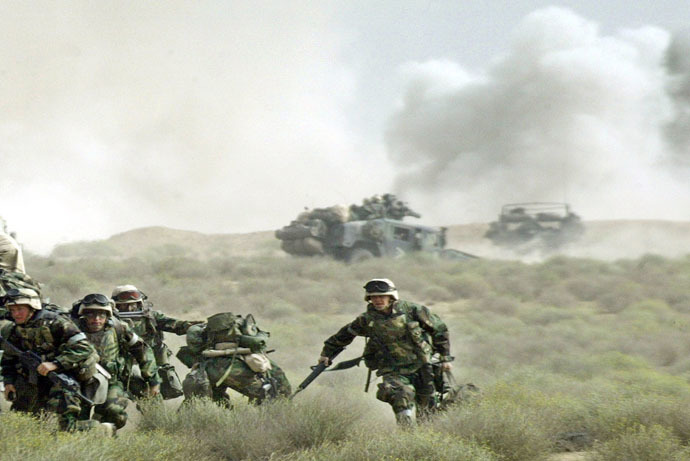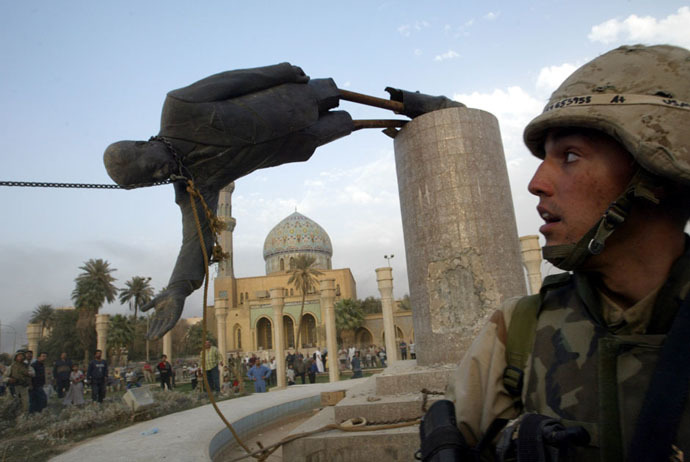‘What we’d done in Iraq had been fairly useless’ – ex-Reuters bureau chief in Iraq

Reuters covered the day-to-day bloodshed and killing, but we failed to give the proper context that would allow readers to understand what was going on, said the former head of the Reuters bureau in Iraq, Andrew MacGregor Marshall.
Andre Vitchek:Andrew, as the former head of Reuters in Iraq, you are perhaps now comparing how the Middle East has been covered, to the coverage of events in this part of the world - Southeast Asia. Could you talk about the similarities and differences?
Andrew MacGregor Marshall: I left Reuters in quite controversial circumstances, back in 2011, because I had obtained a lot of documents, leaked US documents that shed light on the monarchy and its role in Thailand’s history. And these documents are illegal in Thailand, because you are not allowed to tell the truth about the monarchy’s role.
To me as a journalist, it’s our duty to tell the truth. And if we have to break the local laws to do so, we have to do that. And if we are not willing to do it, we at least have to say in our stories that we can’t tell the full truth, because local laws prevent us. So I became really uneasy with Reuters’ coverage and the whole mainstream media’s coverage of Thailand and that’s why I left.
And this was a process that had begun, I think, in Iraq. Because almost from the start in Iraq, Reuters and all foreign journalists could see it was a catastrophe; it was an ill-thought out intervention; there was massive corruption, massive incompetence, and this fact is now so widely recognized... I don’t think it is now even up for debate that the US and British-led intervention in Iraq was a disaster.
We had lost six staff during my time there... They were killed; five of them killed by the US military, allegedly by mistake, and one killed at a checkpoint by a sectarian death squad.
I started to think: we’d sacrificed so much to be there and my Iraqi staff especially, had sacrificed so much... and in the end, when I looked back, had we really helped any understanding of what happened? I don’t think we did. Every day we’d focus on the latest car bombing and the number of dead... and the number of dead became almost incomprehensible; you’d have 80 dead in car bombings in one day, you’d have 50 headless corpses dumped in the street in Baghdad... So it was a constant stream of horror that was making our headlines...

But I don’t think that readers can really understand that kind of coverage. Certainly me, now, even though I know what a car bomb looks like, and I know what mass killing looks like, because I’ve seen it; when I read about Syria, for example, I find it very hard to process this information: it’s just blood and gore, without the context. And I came to believe that what we’d done in Iraq had been fairly useless, because we covered the day-to-day bloodshed and killing, but we failed to give the proper context that would allow readers to understand what was going on. It was almost like bloodthirsty entertainment. It makes headlines, but I don’t think mainstream media coverage of these conflicts really produces understanding. In fact I say it does the opposite, it prevents understanding. There is a focus on blood and gore and there is no attempt to really explain what the geopolitical forces behind it are.
AV:Was it designed like this? Of course Reuters is not the only media outlet, the only agency, which has adopted this approach...
AM: I don’t think it’s so much an obvious conspiracy. It’s just the debate is framed in a way that it delegitimizes opposing viewpoints. I have been a member of the mainstream media for 17 years of my career, and I believed I was doing good, nobody ever told me I should follow a certain political line and certainly nobody ever told me that I should lie, and if they ever had I would refuse. I think most of my colleagues in the mainstream media are similar.
But what was interesting is that it’s more insidious than that. There is a certain discourse that becomes normalized, in which certain views are acceptable and others not. And if you make obvious statements, you know, like about the role of banks or global superpowers, and about the disaster that’s befallen the world in many areas in recent years, you are often marginalized as some sort of loony figure. And there is a “cult of moderation,” of being “neutral”’ in the media. Being neutral is normally held to be that if there is a crazy right-winger or left-winger, you are somewhere in the middle. But obviously, truth is not always in the middle. We may not always know the truth, but there is objective truth. And it does not always lie in the middle between the two extremes.
I think it is through this process that the mainstream media basically becomes a tool of misinforming people, rather than informing people. It’s not so much deliberate lies, although some clearly do engage in deliberate lies, but it’s just the sense that there are some things that are safe to say that we become conditioned that they are safe to say, and there are other things that we probably know them to be true, but if we say them we are mocked or delegitimized.
So the conversation is channeled quite subtly, in a way that deviates from the truth.
‘We saw torture become normalized in Guantanamo, Abu-Ghraib and Bagram’
AV:Is there a self-censorship?
AM: Absolutely! I mean, in Thailand, which is now my main area of expertise, there is clearly self-censorship, because there is a law, the lèse-majesté law that forbids discussion of the monarchy.
But more subtly, when I was covering Iraq, I used to get stories all the time, of US troops involved in rapes and theft... I also had three of my own staff who were tortured and sexually abused by US troops, prior to Abu-Ghraib. I was stunned when I heard about the sexual abuse...
AV:Men or women?
AM: Men. But this was actually a systematic policy, I think. It has been well documented by now. The US narrative that Abu-Ghraib was just a few bad people, who did things that were not allowed, is ridiculous. We have seen Guantanamo, Abu-Ghraib and Bagram, and many other US detention centers. We have seen torture, and sexual torture became normalized. But when I was trying to report any story like this for Reuters, my editors would demand enormous evidence. I had to jump over innumerable hurdles to prove that my staff had been tortured. And I knew these men very well and I knew they were telling me the truth.

But if we wanted to report on atrocities by a militant group in Baqubah or Fallujah, we would just write “that it had been reported,” and there would be no attempt to ask us to prove what happened, because it was just assumed that this is what the militants do – they do bad things, and the Westerners do good things. So the standard of proof was totally different. It was done in a subtle way. We were never told to lie, and we were genuinely always trying to tell the truth. But looking back I can see we were coming from very constrained cultural lands, for we looked at things with a certain mindset and we failed to understand that most Iraqis and indeed most of the people in the Middle East and around the world, they don’t look at the world from a Western or US-centric mindset.
'Iraq changed me forever'
AV:Of course the perks are quite good, too. People working for Western corporate news agencies or the newspapers and television channels, are very well paid. It is always quite a big risk to go against the mainstream narrative, because the journalists can lose all these perks in an instant.
AM: I think it is more insidious than that. I don’t think it is actually about people fearing that they will lose their job if they say the wrong thing. I think it is... I am a British journalist, and I worked for a British-American company. I was working in the Middle East and Asia, where many people have a very different view of the world. But I was bringing along my own preconceptions, and my company’s preconceptions. So we didn’t properly understand that most Iraqis or most Thais or most Iranians see the world in a very different way. And they didn’t see the Westerners as the good guys. So I think that there is tendency for the Western media to claim that it is neutral and unbiased, when in fact it’s clearly propagating a one-sided, quiet nationalistic and selfish view of its own interventions in these countries. If I’d ever been told by any of my bosses to lie, I would have quit. And I ended up quitting, because I was told to lie about Thailand. But it’s done more subtly. If you want to accuse the US military of an atrocity, you have to make sure that every last element of your story is absolutely accurate, because if you make one mistake, you will be vilified and your career will be over. And we have seen that happen to some people in recent years. But if you want to say that some group of militants in Yemen or Afghanistan or Iraq have committed an atrocity, your story might be completely wrong, but nobody will vilify you and nobody will ever really check it out.
AV:Andrew, how horrible was Iraq? You were there; you witnessed atrocities committed by the West, by the United States... How bad was it really? Perhaps more than a million people died?
AM: Yes.
AV: ... Before the invasion and after the invasion...
AM: It was a shocking time. It changed me forever. These kinds of times change anybody. Of course the people that are most changed and traumatized are the national populations who are involved. But it was the first time that I was exposed to the extreme violence that became “normal,” where every day there were corpses on the street. Every day there were bombings, and it’s a terrible thing when the car bombings, decapitations, and torture become routine. And the danger of it is that the readership or the audience for this news becomes desensitized... And to some extent I am desensitized now by the coverage of Syria. I think one of the challenges for journalists and filmmakers is to find a way to engage the audience, because people don’t want to be depressed by pictures of bloodshed and horrors... But they need to be aware of it.
AV:So when their governments commit atrocities in their name and in the name of their cultures, you think we should be sensitive to the viewers who elect these governments?
AM: No, I don’t believe we should be sensitive, but we need to find a way to engage the audience. A complaint that I often hear from journalists, including me sometimes, is that the audience wants to click on a story about Paris Hilton, but not on a story about car bombing in Syria... and I think, that’s human nature. People do want to often avoid unpleasant news. And they often do want to read celebrity froth.

AV:And they want to avoid responsibility, very often...
AM: Partly. But they also don’t want to depress themselves.
I think it is our responsibility to dig deeper and talk about causes. Why are these conflicts happening? So rather than focus on the froth and the atrocities, and the horror on the top, which are important, we have to also try and provide the framework that allows people to understand why this is happening.
AV:You are talking about philosophical journalism, which was practiced by great writers like Burchett, Kapuściński, Orwell... But this sort of journalism seems to be dying, unfortunately.
AM: It seems to be dying in the mainstream media, but my impression is that in the new media, on-line, there is a much greater appetite for this.
AV:Andrew, where is Iraq going?
AM: Well, as you know, Iraq is falling apart. The Kurds will probably have their own state, which they probably deserve, because their people have been stateless for so many years. But what we are seeing is a much wider Shia versus Sunni conflict, across the Middle East, in which Saudi Arabia in particular, and also the Gulf countries, are playing a baleful role. And we see the tentacles of this spreading much further, even into Indonesia and Malaysia.
Iraq is an artificial country that was created by the British by cobbling together various groups that don’t really want to live together. And like so much else in the Middle East, it’s unraveling and it’s proven to be a disaster. So it is an unfolding tragedy. We cannot look at what’s happening in Iraq without looking at the wider Middle East context, which is also an unfolding tragedy, and I think it could well be the defining conflict for our era.
The discussion took place in Phnom Penh, Cambodia, in early August 2014
The statements, views and opinions expressed in this column are solely those of the author and do not necessarily represent those of RT.
The statements, views and opinions expressed in this column are solely those of the author and do not necessarily represent those of RT.













